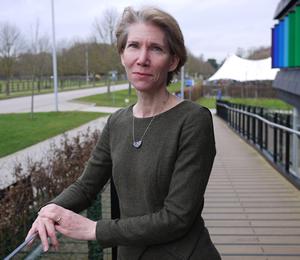
Submitted by Angela Walters on Fri, 01/03/2019 - 15:17
In her monthly round-up of activities at the Centre for Digital Built Britain, Alexandra Bolton, Deputy Director at CDBB, welcomes the latest report from the National Infrastructure Commission and looks forward to talking digital transformation at FutureBuild.
The recently published National Infrastructure Commission (NIC) Annual Monitoring Report 2019, which names the Centre for Digital Built Britain as key to the development of digital twins, acknowledges our advances in this area.
The Report sets out the Commission’s views of government progress over the past year in response to the six in-depth studies published by the Commission that bring focus to Smart Power; Transport for a World City; High Speed North; Connected Future; Partnering for Prosperity; and Data for the Public Good
Stating “CDBB is in a position to develop itself as a centre of excellence and learning for digital twins and should be supported to do so”, the Report commends the work of the Digital Framework Task Group (DFTG) towards the information management framework leading to the establishment of a National Digital Twin – highlighting this work as a Data for the Public Good success.
I am delighted that the work of CDBB, DFTG and its working groups in creating the Gemini Principles and the soon-to-be-published Roadmap has been recognised in the Report. We are excited to be working with others on the information management framework and pilot studies that will produce the foundations to allow the creation a national digital twin.
The Built Environment Smart Cities Development Conference held in Oxford last month brought focus to collaboration between public and private sector leaders across the built environment industry to ensure development and regeneration across our city regions are smart, sustainable and contribute further to the economic growth of the UK. The panel discussion that I contributed to considered the role of universities within smart cities and contributions from representatives from the University of Reading, University of Manchester and the Open University and chaired by Michelle Duggan from Newcastle Helix, highlighted how universities are integral to the development of our future smart cities.
Looking ahead to next month, members from the CDBB team will be taking part in the upcoming FutureBuild event on 5 March, at ExCel, London, where we will join Karen Alford, Flood and Coastal Risk Manager for the Environment Agency, in a panel session titled ‘Creating a digital built Britain’.
This session sets out the huge opportunity that a digital built Britain brings to the UK. My presentation will give an overview of the work of the Centre and the potential for digital to transform the construction and infrastructure sectors. Mark Enzer, Chief Technical Officer at Mott MacDonald and Chair of the DFTG, will look at the role of information management, where are we now and where are we going. This session introduces the ‘Gemini Principles’, providing a conscience and values for a national infrastructure data framework, and how these will enable interoperability and ultimately help lead to the development of a National Digital Twin. Ajith Parlikad, Senior Lecturer in Industrial Systems, Institute for Manufacturing, University of Cambridge, will talk about the CDBB’s Digital Twin pilot which clearly demonstrates CDBB’s cutting-edge research working with industry to pilot and optimise digital twins. Karen Alford will reflect on the progress made at the Environment Agency, calling on her first-hand experience of BIM implementation, including operations from the real world and lessons learned from the digital journey. I look forward to seeing you there.
